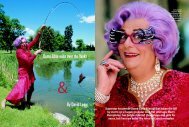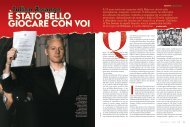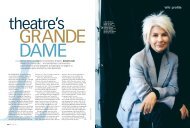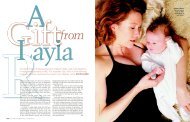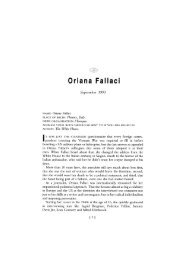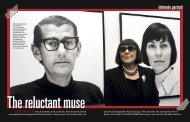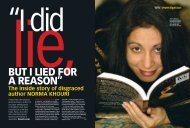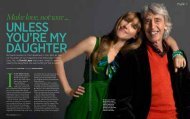Margaret Fink - David Leser
Margaret Fink - David Leser
Margaret Fink - David Leser
You also want an ePaper? Increase the reach of your titles
YUMPU automatically turns print PDFs into web optimized ePapers that Google loves.
<strong>Margaret</strong> <strong>Fink</strong><br />
HER<br />
WILD,<br />
WILD<br />
WAYS<br />
Bohemian wild child and friend of the famous and<br />
infamous, film producer <strong>Margaret</strong> <strong>Fink</strong> talks to <strong>David</strong><br />
<strong>Leser</strong> about the highs and lows of her amazing life.<br />
“COME IN, COME IN … The house is in<br />
mayhem,” shrills the voice from the kitchen<br />
and that’s the first thing you notice about<br />
<strong>Margaret</strong> <strong>Fink</strong>. The voice. At full throttle,<br />
it can slice the air like a sharp instrument, a<br />
weapon both of attack and defence. Sitting<br />
somewhere between an exclamation mark<br />
and an officer’s indignant command, it’s also<br />
the voice, as one friend notes, of a “five<br />
star swearer”. “Can you f*** it up a bit,<br />
love,” she said to Luke Davies, the author<br />
of Candy, when he was trying to fine-tune<br />
the film script. “It’s not dark enough.”<br />
The second characteristic you notice<br />
about <strong>Margaret</strong> <strong>Fink</strong> is the eyes, a pair of<br />
almonds which Patrick White once described<br />
as “mosaics of experience”. That was<br />
before he wrote them into his novel,<br />
The Twyborn Affair. “<strong>Margaret</strong>, I’ve put<br />
your eyes into my next novel,” the great<br />
author told her one day. “Oh, that’s nice,”<br />
<strong>Margaret</strong> replied. “Yes,” White replied.<br />
“They’re the eyes of a transvestite!”<br />
“Patrick loved her,” his biographer,<br />
<strong>David</strong> Marr, tells The Weekly. “She gave<br />
him lip, but she was sexy with it. He loved<br />
her because she was a serious film-maker<br />
trying to make good films based on<br />
good Australian writing. She was sassy,<br />
independent and sharp.”<br />
<strong>Margaret</strong> <strong>Fink</strong> has produced some<br />
memorable films in her life – namely<br />
My Brilliant Career, which set Judy<br />
Davis and Sam Neill on their international<br />
trajectories nearly 30 years ago, and now<br />
Candy, the acclaimed heroin-fuelled love<br />
story which reaffirmed the soaring talents<br />
of two more Australasians, Heath Ledger<br />
and Abbie Cornish.<br />
In between these two shining cinematic<br />
moments, there have been a number of other<br />
credible efforts, all of them adaptations<br />
from Australian literary works, namely<br />
<strong>David</strong> Williamson’s The Removalists,<br />
Christina Stead’s For Love Alone and<br />
Sumner Locke Elliott’s Edens Lost.<br />
Next time <strong>Margaret</strong> <strong>Fink</strong> makes a film,<br />
she might like to think about basing it on<br />
her own life. Feminist, atheist, one-time<br />
anarchist, artist, stylist, pianist, writer,<br />
hostess par excellence and, of course,<br />
film producer, there’s surely enough raw<br />
material to work with.<br />
The film could start, perhaps, in the<br />
pubs of post-war Sydney – places longdemolished<br />
now, such as the Tudor, the<br />
Newcastle and the Assembly – where a<br />
group of intellectuals, musicians, artists,<br />
journalists, students and general larrikins,<br />
known loosely as the Sydney Push, used<br />
to gather to discuss politics, philosophy<br />
and the sexual mores of the day.<br />
Among these free-thinking minds and<br />
unchained hearts was a precocious, wildeyed<br />
beauty named <strong>Margaret</strong> Elliott who’d<br />
just broken free from her own family to<br />
enter Sydney bohemian society. The film<br />
could begin with her in one of these pubs,<br />
a stylish slip of a thing, smoking Camels,<br />
occasionally high on dexedrene (an overthe-counter<br />
amphetamine of choice in<br />
those days!) and disarming all and sundry<br />
– particularly the men – with her sharp<br />
wit, athletic mind and come-hither looks.<br />
The film would then go on to trace the<br />
life of post-war Sydney and some of its<br />
more memorable characters, with <strong>Margaret</strong><br />
a fixture in nearly every scene. There she<br />
would be at 18, a budding art teacher, having<br />
just lost her virginity to a 31-year-old<br />
returned serviceman (He knew what he was<br />
doing!), or at 19, falling in love with the poet/<br />
philosopher Harry Hooton, a man 25 years<br />
her senior and a central figure in the Push.<br />
(<strong>Margaret</strong>’s straightlaced parents,<br />
Dixie and Jack Elliott, would be appalled<br />
when their daughter moved into a Kings<br />
Cross bed-sitter with Harry, but Dixie –<br />
good-natured soul that she was – would<br />
eventually buy the couple a double bed!)<br />
Then the film might fast forward five<br />
years and <strong>Margaret</strong>, still with Harry Hooton,<br />
would be conducting a wild, clandestine<br />
affair with young Barry Humphries, just<br />
as Barry’s monstrously satirical creation,<br />
Edna Everage, was beginning to stormtroop<br />
her way out of Moonee Ponds.<br />
For some early black humour – and<br />
there would need to be plenty of it in this<br />
film, to capture the central character –<br />
<strong>Margaret</strong> would reveal herself as one <br />
PHOTOGRAPHY BY TIM BAUER.<br />
WW | Profile<br />
A magnet for brilliance:<br />
<strong>Margaret</strong> <strong>Fink</strong>, 73, holds<br />
a photograph of herself<br />
taken by her ex-husband,<br />
Leon, in 1963, when she<br />
had just turned 30.<br />
64 | WW JANUARY 2007 WW JANUARY 2007 | 65
of Barry’s minders while he did battle<br />
with the demon drink, particularly one<br />
riotous day in 1971 when he went on a<br />
bender at Sydney’s Gazebo Hotel.<br />
<strong>Margaret</strong> and Barry would no longer be<br />
lovers, but the loving concern would still<br />
be there as she walked into his hotel room<br />
to find Barry missing, but with all his clothes<br />
left behind. “Oh God, no,” she’d mutter to<br />
herself. “He’s at the bottom of the pool.”<br />
Well, not quite. Barry would be sitting at<br />
the front bar, completely naked, having a<br />
double whisky with the hotel manager.<br />
And then, after Harry and Barry had<br />
departed the scene, there would be marriage<br />
to, children with and divorce from Leon<br />
<strong>Fink</strong>, the turquoise sports car-driving<br />
property developer, who at one time,<br />
according to Germaine Greer, was the<br />
“most upsettingly beautiful man” at<br />
Melbourne University. The film might<br />
look at this modern marriage, but also at<br />
the great sisterly bond forged between<br />
these two formidable women – Germaine<br />
and <strong>Margaret</strong> – in young Mr <strong>Fink</strong>’s bed.<br />
“I’ve just fallen in love with this gorgeous<br />
man,” <strong>Margaret</strong> would tell Germaine at their<br />
favourite Repin’s Café one day in 1961.<br />
“His name is Leon <strong>Fink</strong>.” Germaine would<br />
literally drop her coffee cup and exclaim,<br />
“But he’s the guy who deflowered me”.<br />
So any film – or story for that matter –<br />
about <strong>Margaret</strong> <strong>Fink</strong> would have to capture<br />
this unfailing talent for spotting brilliance<br />
– brilliant lovers, brilliant friends, brilliant<br />
actors – and the ability to then bring them<br />
into her radiant circle.<br />
“She runs one of the few remaining salons<br />
left in the country,” says Nicholas Pounder,<br />
the former second-hand book dealer and<br />
friend to both Barry Humphries and<br />
<strong>Margaret</strong> <strong>Fink</strong>. “She is a pollinator. Through<br />
<strong>Margaret</strong>, you’ll meet actors, artists, authors,<br />
journalists, judges, the occasional ratbag<br />
… Somehow, she brings about the best<br />
informal brainstorming I’ve ever seen … the<br />
first rule, of course, being never to be dull.”<br />
So you could also make your starting<br />
point any one of the celebrated parties<br />
for which <strong>Margaret</strong> <strong>Fink</strong> has become<br />
renowned. The so-called last lunch for<br />
Patrick White (where she cooked her<br />
signature salmon dish in a fish kettle<br />
and did the potato salad not once but<br />
twice, just to make sure it was right).<br />
The birthday party for Germaine Greer.<br />
The dinner for the late journalist, author<br />
and rock music writer Lillian Roxon. The<br />
70th birthday party for Sydney couturier<br />
Frankie Mitchell, when 120 people gathered<br />
at the <strong>Fink</strong>s’ Gothic pile in the Sydney<br />
suburb of Woollahra to donate money<br />
A<br />
towards Frankie’s dying wish – a farewell<br />
trip to New York City.<br />
These were parties often held in the<br />
grandest of styles – Cole Porter music wafting<br />
in off a candle-lit driveway, butlers and<br />
French champagne in art-filled rooms, and,<br />
of course, an endless hum of conversation,<br />
often riotous, but always memorable.<br />
Max Lambert, the Australian composer<br />
and musical director, says that most of<br />
the stories he could tell about <strong>Margaret</strong><br />
<strong>Fink</strong> remain “unsuitable for the Women’s<br />
Weekly readership”. Suffice to say, he<br />
has had some of the “best nights” of his<br />
life in her home. And mornings, too.<br />
“Once, between houses, I lived with her,”<br />
he says. “For several mornings in a row,<br />
I sleepily came downstairs and there was<br />
Barry Humphries, the next day, Clive<br />
James, and the third day, Germaine Greer.<br />
“I felt like I hadn’t woken up and was still<br />
dreaming. Of course, this was about 8am<br />
and <strong>Margaret</strong> was fully dressed, had made<br />
breakfast and had done 18 other things before<br />
that. She was in her 60s then and she used<br />
to bound up the stairs two at a time … ”<br />
AS IT TURNS OUT, <strong>Margaret</strong> <strong>Fink</strong> is<br />
still full of restless energy and more. During<br />
our three-and-a-half hours together recently,<br />
the 73-year-old producer of Candy was at<br />
once warm, funny, profane, smart, curious,<br />
cultured, impatient, generous, aggressively<br />
opinionated, modest, egotistical, cheerful<br />
and, perhaps most surprising of all, regretful<br />
to the point of self-laceration.<br />
Her regrets are noteworthy given that it<br />
is a not a word she likes using. “I use it as<br />
a pun sometimes,” she says. “Mar-regret,<br />
instead of <strong>Margaret</strong>. But I suppose in<br />
honesty I do have some regrets. I’m sorry<br />
I didn’t get more out of my parents.”<br />
Both of them, Dixie and Jack Elliot, were<br />
fine singers who had met at Sydney’s<br />
Conservatorium of Music just prior to the<br />
Great Depression. Dixie, in particular, could<br />
have gone on to become one of Australia’s<br />
finest sopranos had she not chosen family<br />
life instead. “She decided to have four<br />
children from the word go,” her daughter<br />
says now. “Two to replace yourself and two<br />
more – that was my mother’s philosophy.”<br />
The marriage, according to <strong>Margaret</strong>,<br />
was “an unpleasant, bickering affair”, with<br />
Dixie running the show. No alcohol was<br />
allowed in the house and movies were<br />
banned because they were considered<br />
too vulgar, dangerous or both. (<strong>Margaret</strong><br />
was 19 when she first saw Jean Renoir’s<br />
masterpiece, The River, the film that changed<br />
her life forever.) Saturday mornings were<br />
set aside for the study of music at the<br />
conservatorium. Afternoons were free for<br />
play – in the backyard, but not the front.<br />
Sunday mornings were for church, then<br />
the long walk home for the family baked<br />
lunch, then church again in the evening.<br />
“No wonder I broke out,” <strong>Margaret</strong> exclaims<br />
now, referring to her rejection of God and<br />
her embracing of all that the Push stood<br />
for – anti-authoritarianism, sexual liberation<br />
and a Socratic search for the truth.<br />
Yet something rubbed off, too, from<br />
her artistic parents. <strong>Margaret</strong> became a<br />
fine pianist and art teacher. She learnt to<br />
cook and sew and decorate. She developed<br />
an eye for beauty that was to then find its<br />
fullest expression in the men she loved,<br />
the spaces she occupied and the films she<br />
would eventually produce.<br />
Today, for example, her Keith Cottier-<br />
“She is a pollinator. Through <strong>Margaret</strong>, you’ll meet actors,<br />
artists, authors, journalists, judges, the occasional ratbag … ”<br />
designed home – although turned upside<br />
down by the house painters – is still a<br />
delightful testament to her interests and<br />
eclectic style: shelves filled with Baroque<br />
CDs and books on film and classical<br />
literature; walls covered in oil paintings,<br />
wood blocks and her own originals; a<br />
kitchen with hanging breadbaskets and<br />
various bric-a-brac from around the world;<br />
a bathroom of Italian limestone with a bath<br />
in the middle and a juliet balcony, all<br />
converging on a courtyard with a cumquat<br />
and a mandarin tree in the middle, and<br />
wisteria climbing into a summer green room.<br />
And all this found inside two converted<br />
19th-century workers’ cottages, which<br />
<strong>Margaret</strong> shamelessly wants to expand on.<br />
“I’m afraid I covet the third one [next<br />
door] because I should have the third one,<br />
obviously,” she says with the mirth catching<br />
in her throat. “You’re not meant to covet<br />
your neighbour’s anything, but I covet my<br />
neighbour’s house. Shocking isn’t it?”<br />
And with that she lets out a deep, raucous,<br />
self-mocking laugh.<br />
It is this brutal honesty which Jacki<br />
Weaver remembers first put her off<br />
<strong>Margaret</strong> <strong>Fink</strong> when they met more<br />
than 30 years ago. Jacki was in <strong>David</strong><br />
Williamson’s play, The Removalists, soon<br />
to be cast in the movie of the same name.<br />
“She was a force to be reckoned with,”<br />
Jacki says now. “She took no prisoners …<br />
but all the things that made me a bit<br />
guarded about her then are the things<br />
I love about her now. There is nothing<br />
simpering or mealy-mouthed about<br />
<strong>Margaret</strong>. She is totally honest … and she<br />
has been like that all her life. In fact, her<br />
whole life is a beautiful design. There is<br />
nothing false or pretentious about it.”<br />
Part of this beautiful design, of course,<br />
is to be found in her blazing eye for<br />
PHOTOGRAPHY BY TIM BAUER.<br />
<strong>Margaret</strong> at her Sydney<br />
home, a “Gothic pile”<br />
renowned for parties, often<br />
held in the grandest<br />
of styles, and attracting<br />
world-famous identities.<br />
66 | WW JANUARY 2007 WW JANUARY 2007 | 67
talent. With The Removalists, the actors<br />
were cast by mutual agreement with director<br />
Tom Jeffrey, although <strong>Margaret</strong> recognised<br />
straight away the creative powers of the<br />
young playwright, <strong>David</strong> Williamson.<br />
With Tirra Lirra By The River, a film<br />
based on Jessica Anderson’s novel, which<br />
<strong>Margaret</strong> spent 10 fruitless years trying to<br />
breathe cinematic life into, she picked an<br />
unknown Cate Blanchett for the main role.<br />
With For Love Alone, which <strong>Margaret</strong><br />
spent seven years bringing to fruition, she<br />
cast a young Hugo Weaving straight out<br />
of NIDA for his first feature role.<br />
And, of course, with My Brilliant Career,<br />
it was <strong>Margaret</strong>’s baby from day one. After<br />
being sent a copy of Miles Franklin’s famous<br />
turn-of-the-century novel in 1965, she<br />
immediately bought the film rights – 14<br />
years before the film would be completed.<br />
She then used her own fabric and<br />
linen for the set, selected the music<br />
(Schumann’s Scenes from Childhood)<br />
and, of course, chose the scriptwriter<br />
Australian one morning in bed and we’d<br />
been looking for [the] Harry Beecham<br />
[character] for years and I saw this photo<br />
of this guy [Sam Neill] and I thought, ‘That’s<br />
Harry Beecham’. So I got him to come<br />
around to [my house] just to make sure – face<br />
to face – that I was right. And I opened the<br />
door and there was Harry Beecham, at last.”<br />
Based on the story of a poor farmer girl’s<br />
struggle against society’s conventions,<br />
My Brilliant Career was to pick up a<br />
swag of national and international awards,<br />
including six AFIs, two BAFTAs (the<br />
British equivalent of the Oscars) and an<br />
Oscar nomination. According to <strong>Margaret</strong>,<br />
it was her cinematic equivalent of The<br />
Female Eunuch, the feminist international<br />
best-seller which launched her friend,<br />
Germaine Greer’s, writing career in 1970.<br />
And yet <strong>Margaret</strong> remains clearly<br />
distressed by what she believes is the lack<br />
of recognition for her pivotal role in the film.<br />
“My Brilliant Career is so much my film<br />
and I feel really aggravated that Gillian’s<br />
the television mini-series Edens Lost) or<br />
seven years, as with Candy, to see the<br />
project realised.<br />
On the plus side, this also means that,<br />
in her personal life, she is blessed with<br />
innumerable friends, constantly collecting<br />
new ones, rarely letting go of old ones,<br />
generous to a fault with all. Her friend<br />
from Push days, Judy Smith, recalls<br />
<strong>Margaret</strong> learning to become a Double<br />
Bay dress-maker back in the 1950s and<br />
not just sewing fabulous clothes for<br />
herself, but for all her friends as well.<br />
“She made everything she wore,” Judy<br />
says, “and she looked a million dollars. But<br />
she did it for the rest of us, too. Her generosity<br />
was astounding. Each of us, when we left<br />
Australia, would leave with suitcases full<br />
of clothes <strong>Margaret</strong> had made for us.”<br />
And half a century later, one hears the<br />
same refrain. Flowers for a friend when<br />
he is sick. A warm bed when she’s got<br />
nowhere to stay. A place at the table when<br />
one is hungry – for food, conversation<br />
or both. “She understands the perfect<br />
pleasure that great hospitality gives,” says<br />
journalist <strong>David</strong> Marr. “She’s a friend<br />
through thick and thin, fame and infamy,”<br />
echoes Sydney barrister Charles Waterstreet.<br />
“She’s an unusual, fantastic woman and<br />
she has an ambience around her,” agrees<br />
writer Richard Neville. “That’s why we’re<br />
lifelong friends. You can say anything<br />
at <strong>Margaret</strong> <strong>Fink</strong>’s table.”<br />
Richard remembers the funeral two years<br />
ago of a mutual friend, Steve Vadim, a<br />
White Russian cafe proprietor who used<br />
to serve home-made beef stroganoff and<br />
white wine to his bohemian clientele back<br />
in the 1950s. “When he died,” Richard<br />
tells The Weekly, “nobody remembered<br />
him, except <strong>Margaret</strong>. She was there.<br />
She’s able to keep the flame burning.”<br />
Which brings us to the downside of<br />
being unable to let go. Not getting enough<br />
kudos for a film such as My Brilliant Career<br />
is one thing to stick in your craw nearly<br />
68 | WW JANUARY 2007 WW JANUARY 2007 | “She’s an unusual, Mfantastic woman and she has an ambience<br />
around her ... You can say anything at <strong>Margaret</strong> <strong>Fink</strong>’s table.”<br />
(Eleanor Whitcombe), director (Gillian career went like that [pointing skywards] 30 years after the event. Still harbouring deep<br />
Armstrong) and actors. “I went straight to and her bank balance after it … and I got regrets about relationships which ended<br />
the Paris Theatre [in Sydney],” she says nowhere. I didn’t work again for seven years. nearly 50 years ago is quite another. Yet<br />
now as excitedly as if it were yesterday, And that’s because they pick the director that’s what <strong>Margaret</strong> <strong>Fink</strong> feels with respect<br />
“walked into a rehearsal [where Judy Davis … which is not to denigrate Gillian’s to some of the key relationships of her life.<br />
was playing the maid in Louis Nowra’s contribution. It was vast … but in Cannes, Falling for Barry Humphries while she<br />
Visions] and I saw this girl, and I thought, someone said, ‘They’ve got the wrong was still with Harry Hooton still plays<br />
‘I don’t believe it’. Picked her up and took girl’. Because they were all after Gillian havoc with her conscience. Yes, it was a<br />
her to Clays Bookshop in Macleay Street, and I was pushed aside and left out in the wild attraction to Barry, she admits, but<br />
went in and got a copy of My Brilliant cold. And I am a creative film-maker.” ill-fated from the start.<br />
Career, opened it up, crossed out My and<br />
“The first morning [I was with him<br />
put Your, signed it and gave it to Judy … MARGARET FINK finds it hard to in Melbourne], he gave me an order for<br />
Who knows where the copy is? She bags let go. On the plus side, this means she breakfast. ‘I’ll have … ’ I said, ‘Are you<br />
the film whenever she gets a chance. rarely gives up on a project she believes kidding?’ You see, I was a born feminist.<br />
“Now with Sam, I was reading The in, even if it takes her a decade (as with Miles Franklin was a born feminist. <br />
69<br />
COURTESY OF MARGARET FINK.<br />
Leon, <strong>Margaret</strong><br />
and their daughter,<br />
Hannah, who acted as<br />
her nanny’s fl owergirl<br />
at her wedding in 1971.
Mary Wollstonecraft was a born feminist.<br />
I didn’t need The Female Eunuch to tell<br />
me. In fact, you know, the Push and a lot<br />
of things Germaine might have picked<br />
up from me could have helped inform<br />
The Female Eunuch.<br />
“And that’s why Barry and I were<br />
doomed from the word go – because of<br />
my independence and feminism, because<br />
of my atheism and eccentricity … and<br />
because of his right-wing views, set in<br />
cement. At 23!”<br />
Nonetheless, she continued to see Barry<br />
in secret while living with Harry – until<br />
Harry found out and “kidnapped” <strong>Margaret</strong>.<br />
“Look the Harry, Barry, me thing goes on<br />
and on and on and on and on and on,” she<br />
continues, letting out a howl of anguish in<br />
the process. “Arghhhhhhh … You know …<br />
I’ll never know anyone like Harry. Never<br />
… Oh, dear,” she says, those astonishing<br />
eyes of hers now moist with tears. “And I<br />
just loathe the idea of causing him [Harry]<br />
heartache. Really loathe it.”<br />
Harry Hooton died in 1961 and Barry<br />
Humphries and <strong>Margaret</strong> <strong>Fink</strong>’s friendship<br />
foundered recently when <strong>Margaret</strong> was<br />
quoted describing Barry and his politics in<br />
most unflattering terms. “He’s just wiped<br />
me,” <strong>Margaret</strong> says. “That’s the finish of<br />
our friendship and I’m sorry about that.”<br />
Although, perhaps, not surprising, given<br />
that <strong>Margaret</strong> also denounced his politics<br />
to me during our interview, not to mention<br />
the politics of painter <strong>Margaret</strong> Olle and<br />
those of her brother-in-law, controversial<br />
historian Keith Windschuttle.<br />
All of which confirms writer Luke<br />
Davies’ view of <strong>Margaret</strong> as a woman<br />
with a rather startling – and refreshing –<br />
candour. “I love her outspokenness,” he<br />
says, “her hilarious biting wit and, dare<br />
I say it, when she chooses to get into the<br />
realms of character assassination, she’s a<br />
lot of fun. She’s incredibly opinionated.”<br />
<strong>Margaret</strong> also carries sorrow about<br />
her 17-year marriage to Leon <strong>Fink</strong>, a man<br />
she still adores. Together, they share three<br />
children – Hannah, a writer, John, a<br />
documentary maker, and Ben, a guitarist<br />
formerly with The Whitlams. “Leon’s a<br />
fantastic man,” she says. “He’s original …<br />
I think he’s a prince. He’s a very, very<br />
good man. Funny and wayward, but he<br />
gets what he wants.” How do you look<br />
back on the marriage? I ask her. “With<br />
regret,” she replies, without hesitation.<br />
“It was the 1970s and I think it’s fair to<br />
say we were both experimenting.”<br />
After Leon “pissed off” – to use<br />
<strong>Margaret</strong>’s parlance – she then fell for the<br />
hell-raising criminal-turned-playwright,<br />
Jim McNeill. “He really was a handful,”<br />
<strong>Margaret</strong> offers. “Like a lot of criminals,<br />
very right-wing … and once again a<br />
clinical genius [like Harry Hooton and<br />
Barry Humphries].” Yet he was also a<br />
violent drunkard who laid into <strong>Margaret</strong><br />
one day after she refused to continue their<br />
relationship. She managed to escape the<br />
apartment bloodied and bruised.<br />
And then, in the ensuing years, there<br />
were many other lovers, even during<br />
menopause when Mother Nature might<br />
have been urging her to take a well-earned<br />
rest. “I was having a wonderful love affair<br />
[during menopause] and my theory there<br />
is that it probably assists your hormones<br />
and gets them working away.”<br />
At 73 and with “half a facelift” to help<br />
Abbie Cornish and Heath Ledger in Candy.<br />
Left: <strong>Margaret</strong> (centre, back row) on the<br />
set of 1979 fi lm My Brilliant Career, with<br />
director Gillian Armstrong (left), Sam Neill<br />
and Judy Davis (right).<br />
“And that’s why Barry [Humphries] and I were doomed from<br />
the word go – because of my independence and feminism ...”<br />
herself look 15 years younger, <strong>Margaret</strong><br />
<strong>Fink</strong> is still “hunting for treasure”, as<br />
her friend Richard Neville likes to put<br />
it. Not so much in the area of romance<br />
as in the area of work and people. Her<br />
peerless eye for talent found its target<br />
with Candy, first with the initial reading<br />
of Luke Davies’ book and then with her<br />
choice of actors (Heath Ledger and Abbie<br />
Cornish), director (Neil Armfield) and<br />
editor (John Collier).<br />
Then, more recently, she was able to<br />
zero in on the considerable skills of new<br />
playwright Tommy Murphy when she<br />
visited Sydney’s Stables Theatre to see<br />
his latest work, Strangers in Between.<br />
“I went to this theatre and I thought, ‘Oh<br />
Christ, this is the best theatre I’d heard<br />
since early Williamson. Who wrote it?’<br />
‘Tommy Murphy.’ ‘Never heard of him.<br />
Who is he?’ Found out, met him … he’s<br />
recently won the [NSW] Premier’s Award<br />
for best playwright.”<br />
And now the two have teamed up to<br />
work on a new project tentatively called<br />
Eugenia, about a woman who lived as a<br />
man in the first third of the 20th century.<br />
“Oh it’s a fabulous project,” <strong>Margaret</strong><br />
cries with undimmed enthusiasm. “Just<br />
fabulous. I’m so excited about it.”<br />
And let’s hope it gets up for <strong>Margaret</strong>’s<br />
sake. Yet if, for some reason, it doesn’t,<br />
there’s always the one about the feminist<br />
film producer who lived the life of an artist<br />
in post-war Australia, forever thumbing<br />
her nose at convention, turning a gleaming<br />
eye towards beauty and truth, and speaking<br />
out with that boisterous, singular voice<br />
of hers, “Can you f*** it up a bit, love …<br />
MATTS/NEWSPIX.<br />
it’s not dark enough”. ■ KEN<br />
70 | WW JANUARY 2007 WW JANUARY 2007 | 71



